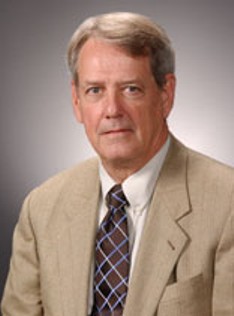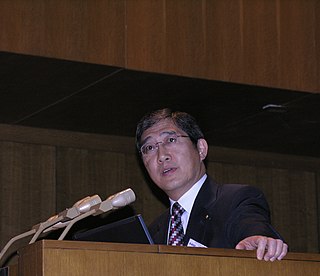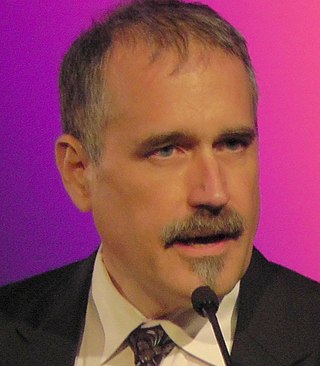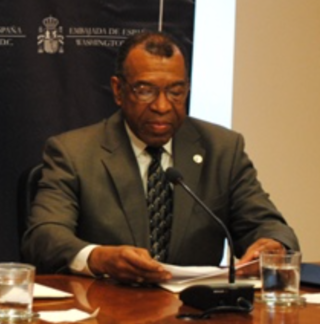Related Research Articles
The Federal Information Processing Standards (FIPS) of the United States are a set of publicly announced standards that the National Institute of Standards and Technology (NIST) has developed for use in computer systems of non-military United States government agencies and contractors. FIPS standards establish requirements for ensuring computer security and interoperability, and are intended for cases in which suitable industry standards do not already exist. Many FIPS specifications are modified versions of standards the technical communities use, such as the American National Standards Institute (ANSI), the Institute of Electrical and Electronics Engineers (IEEE), and the International Organization for Standardization (ISO).
The National Institute of Standards and Technology (NIST) is an agency of the United States Department of Commerce whose mission is to promote American innovation and industrial competitiveness. NIST's activities are organized into physical science laboratory programs that include nanoscale science and technology, engineering, information technology, neutron research, material measurement, and physical measurement. From 1901 to 1988, the agency was named the National Bureau of Standards.

The National Oceanic and Atmospheric Administration is a scientific and regulatory agency within the Washington, D.C.–based United States Department of Commerce, headquartered in Silver Spring, Maryland.

James Sacra Albus was an American engineer, Senior NIST Fellow and founder and former chief of the Intelligent Systems Division of the Manufacturing Engineering Laboratory at the National Institute of Standards and Technology (NIST).

Eugene Howard Spafford, known as Spaf, is an American professor of computer science at Purdue University and a computer security expert.

David A. Bader is a Distinguished Professor and Director of the Institute for Data Science at the New Jersey Institute of Technology. Previously, he served as the Chair of the Georgia Institute of Technology School of Computational Science & Engineering, where he was also a founding professor, and the executive director of High-Performance Computing at the Georgia Tech College of Computing. In 2007, he was named the first director of the Sony Toshiba IBM Center of Competence for the Cell Processor at Georgia Tech.

Carl Kochao Chang is Professor of Computer Science, Professor of Human Computer Interaction and Director of Software Engineering Laboratory in the Department of Computer Science at Iowa State University, where he served as its department chair from 2002 to 2013. He received a PhD in computer science from Northwestern University.
The Environmental Science Services Administration (ESSA) was a United States Federal executive agency created in 1965 as part of a reorganization of the United States Department of Commerce. Its mission was to unify and oversee the meteorological, climatological, hydrographic, and geodetic operations of the United States. It operated until 1970, when it was replaced by the new National Oceanic and Atmospheric Administration (NOAA).

Alan Conrad Bovik is an American engineer, vision scientist, and educator. He is a professor at the University of Texas at Austin (UT-Austin), where he holds the Cockrell Family Regents Endowed Chair in the Cockrell School of Engineering and is Director of the Laboratory for Image and Video Engineering (LIVE). He is a faculty member in the UT-Austin Department of Electrical and Computer Engineering, the Machine Learning Laboratory, the Institute for Neuroscience, and the Wireless Networking and Communications Group.
Professor Benjamin Wan-Sang Wah is the Wei Lun Professor of Computer Science and Engineering at the Chinese University of Hong Kong, as well as the former provost of this university. He was elected President of IEEE Computer Society in 2001.
Pablo Clemente-Colón born in Guaynabo, Puerto Rico is the first Puerto Rican to serve as Chief Scientist of the National Ice Center (NIC), headquartered in Alexandria Virginia, a position he has held since 2005. As such, he serves the three entities that operate the NIC, the United States Navy, the National Oceanic and Atmospheric Administration (NOAA) and the United States Coast Guard.
Martha Ann Evans Sloan is an American electrical engineer. She taught engineering for many years at Michigan Technological University, and became the first female president of the IEEE. Her service to the profession has been honored by several society fellowships and awards.

Raouf Boutaba is an Algerian Canadian computer scientist. His research interests are in resource, network and service management in wired and wireless networked systems. His work focuses on network virtualization, network softwarization, cloud computing, and network security.

Ruth Margaret Davis was an American computer scientist and civil servant who was associated with several major US government research projects. She served as deputy undersecretary of defense for research and advance technology, as assistant secretary of energy for resource applications, and as chair of The Aerospace Corporation.
Akkihebbal Ramaiah (Ravi) Ravishankara ForMemRS FAAAS FRSC is a scientist specializing in Chemistry and Atmospheric Sciences, and University Distinguished Professor in the Departments of Chemistry and Atmospheric Sciences at Colorado State University, Fort Collins.
Ramalingam "Rama" Chellappa is a Bloomberg Distinguished Professor, who works at Johns Hopkins University. At Johns Hopkins University, he is a member of the Center for Language and Speech Processing, the Center for Imaging Science, the Institute for Assured Autonomy, and the Mathematical Institute for Data Sciences. He joined Johns Hopkins University after 29 years at The University of Maryland. Before that, he was an assistant, associate professor, and later, director, of the University of Southern California's Signal and Image Processing institute.
Katherine Lee Morse is an American computer scientist whose work has centered on distributed simulation, on the integration of heterogenous simulation environments, and on standardization of methods for interoperability in simulation, including participating in the development of the High Level Architecture for modeling and simulation. She is a member of the principal professional staff at the Johns Hopkins University Applied Physics Laboratory.

James Marshall Turner is an American physicist and retired government official. Over the course of his career, he served as Director of the National Oceanic and Atmospheric Administration’s Office of International Affairs and as deputy director of the National Institute of Standards and Technology.
Susan K. (Kathy) Land is an American software engineer known for her work in software quality management. She is a program manager in the US Missile Defense Agency, and was the 2021 president of the IEEE.
References
- 1 2 3 4 5 6 Helen M. Wood, IEEE Computer Society, retrieved 2021-02-20
- ↑ Showstack, Randy (2003), "Report lays out initial hazard risk reduction priorities", Eos: Transactions of the American Geophysical Union, 84 (38): 378, Bibcode:2003EOSTr..84Q.378S, doi: 10.1029/2003eo380003
- ↑ "Director of NOAA's Office of Satellite Data Processing and Distribution Receives Meritorious Presidential Rank Award", News and Notes, Bulletin of the American Meteorological Society, 79 (7): 1440, July 1998
- ↑ "Fellows from the IEEE Computer Society", IEEE Fellows directory, IEEE, retrieved 2021-02-20
- ↑ Richard E. Merwin Award for Distinguished Service, IEEE Computer Society, retrieved 2021-02-20